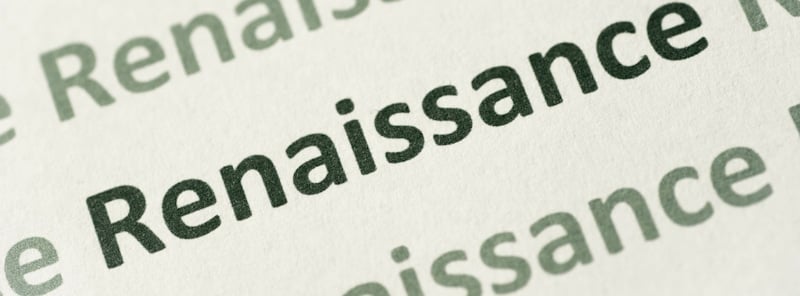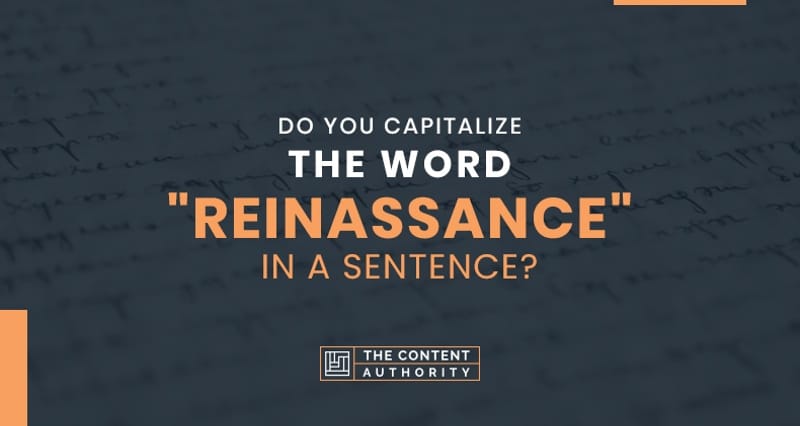Even those with great communication skills and a whole lot of confidence speaking might second guess themselves when saying or writing certain words. You might wonder whether you should capitalize a word or not. The word “Renaissance” is one of those that we have heard multiple times but it can still keep us on our toes when it comes to capitalization.
The word “Renaissance” is capitalized in most sentences in which it is used. It normally acts as a proper noun referring to the historical period in Europe that started after the 14th Century. Hence, with a few exceptions, the word “Renaissance” will normally be capitalized.

Even though the main capitalization rule for the word “Renaissance” has been highlighted but it is important to consider the various examples and other key terms in which other such capitalization rules apply or become a total exception to such types of main rules.
“Renaissance” or “Renascence” Which Should We Capitalize In a Sentence?
Generally, both of these words “Renaissance” and “Renascence” are pronounced quite similarly, the first one, “Renaissance” sounds more French than the other. However, the difference in their spellings is the only point of emphasis for the rules of capitalization to be applied since they both mean the same, one is more connected to English and the other to its French roots.
Both of these words mean the same that it is the reawakening of something after a long time. However, the word “Renaissance” resonates with its meaning towards the centuries from the fourteenth to seventeenth when Europe transcended towards a new era.
For example,
- The Renaissance artists took their time to ensure that there were no details left to spare.
In this example, the word “Renaissance” is capitalized because it was directly referring to that distinct era. Although, it is important to point out that in some cases, the word “Renaissance” won’t be capitalized and it is entirely based on the meaning the sentence is reflecting. However, unlike the word “Renaissance”, the word “Renascence” will not be capitalized in the sentence. For instance,
- His faith experienced a renascence when he started to observe the universe on his own.
- The renascence of western music indicates that people do enjoy this genre of music.
In this instance, the word “Renascence” was not capitalized because it was used in general terms as a noun which didn’t indicate any distinct reference or quote.
Does the Word “Renaissance” and Other Similar Terms Have Common Capitalization Rules?
With an enormous list of capitalization rules, you might find it hard to keep up with all such rules when drafting your sentences or paragraphs. Normally, you might question yourself if you do capitalize the word “Renaissance” in a sentence along with other such types of terms. In such a case, here a few rules that you will remember instantly when capitalizing.
1. A Phrase or Sentence Containing a Noun With a Unique Meaning
A primary and basic rule that repeats itself frequently in every other sentence, is the capitalization of the first letter of a noun with a very specific or unique reference. Ideally, this rule is followed to highlight and place emphasis on the unique word from all other general words.
For example,
- I like to drive my Ford every weekend for a long road trip.
In this instance, the word “Ford” was capitalized because it was a unique name that was different from other such names. The word “Renaissance” is also capitalized in the same manner as it mostly refers to a pinpointed era with a great history.
2. Common Nouns Prefixed With Unique Titles
Sometimes, a common noun is preceded with a proper noun that becomes a unique title and thus overall the phrase gives a newer meaning. The proper noun is no doubt capitalized but the common noun may or may not be capitalized depending on the various situations. For instance,
- It’s true that he is a Renaissance man despite his lack of knowledge in other areas.
In this example, the word “Renaissance” is a proper noun that was subsequently followed with a common noun “man” that gave an entirely new meaning as a whole. There are some cases when the title and the common noun are both capitalized and those cases may either involve the special title or quote.
For example,
- “Talladega Nights: The Ballads of Ricky Bobby”
This example represented a title in which the common noun is preceded with a proper noun and thus both are capitalized as this entire title is unique.
3. Initiating Word In a Sentence
This rule applies in every case and is followed more frequently than the first rule mentioned above. You must remember to capitalize on the first letter of the initiating word of a sentence whether it is a proper noun, common noun or adjective, etc. The first word must be capitalized.
For example,
- Renaissance was a great part of Europe’s history.
In this case, as the word “Renaissance” was the initiating word of the sentence hence it was capitalized. The main reason to capitalize on the commencing word of the sentence is to clearly distinguish the completion of one sentence from the other.
These three rules are simple and yet effectively applied in almost all sentences on a frequent basis. Even if you question yourself if you do capitalize the word “Renaissance” in a sentence along with other terms, then don’t feel shy to recall these rules every time you write a sentence.

When Do We Not Capitalize the Word “Renaissance” in a Sentence?
It is true that the word “Renaissance” is also not capitalized in some instances and mainly it involves the use of the word in a different context. As always, every rule has an exception but these exceptions only occur at specific points in time when they are highlighted through their use.
Some of these exceptions for the word “Renaissance” and other such types of terms are as follows:
1. The Word “Renaissance” Used In Different Context
The word “Renaissance” means reawakening. Even though you might think that the word “Renaissance” is only used to refer to a specific historical event, there are cases when it is used as an adverb or composite noun.
For example,
- Pop culture is currently experiencing a renaissance.
- People are enjoying the renaissance of old music.
In both of the examples, the word “Renaissance” is being used in an entirely different context. That is why it is not capitalized. Cardinal Points are another type of words that are also not capitalized in certain scenarios.
For example,
- He lives on the west side of California.
- There is a really beautiful waterfall on the north side of the forest.
Cardinal Points are supposed to be capitalized but in fact, they are not capitalized in these examples. That is because they are referring to a general direction rather than the exact and common use of the cardinals and hence are not capitalized.
2. The Word “Renaissance” Referring to a Common Title
As mentioned above in point 1, if the word “Renaissance” is not used to specify the historical event of Europe, then it will not be capitalized. The same case follows when it is used for the common titles. It is very crucial to remember the various cases and situations when we capitalize on the word “Renaissance” in a sentence.
The crucial one is to remember that when the word “Renaissance” doesn’t refer to the unique event and is used with another common noun.
For example,
- The party had a Halloween renaissance theme where everyone was asked to dress extremely spooky.
These exceptions to the main rule are rarely seen in various sentences since it is better considered to adopt a more to the point, understandable, and plain English. However, with the knowledge of such exceptions, you will surely show your superiority on the command of such rules and exceptions.
Further Reading: When Should You Capitalize “Into” In A Title?
Can These Rules and Exceptions Be Summarized In Various Examples?
Although these rules and exceptions can be used in a combined form in the various examples to simplify understanding and clarify all the rules, it is helpful to organize examples to illustrate each of the rules.
Here are some of the examples,
- Renaissance was considered an important historical event otherwise the dark ages of Europe would have never ended.
- She was forced to consider that he was a Renaissance man even though he had various lack of details in his knowledge.
- They never thought the renaissance of the old country music in the people was due to the young generation.
- He was surely impressed by the work of the Renaissance artists and painters.
In the first and second examples, the word “Renaissance” was following the primary rules and hence they were capitalized while in the third example the word was used in a different context and hence it was not capitalized. It is again important to note that the word will only be capitalized when it is providing the contextual meaning in specific reference.
So, How Frequently Are We to Capitalize the Word “Renaissance”?

Yes, in frequent and common use, the word “Renaissance” will be capitalized as the majority of the sentences will always refer to the specific era the word is referring to. Other than the exceptions mentioned above, the word “Renaissance” will be capitalized.
That is because in most sentences or texts the word “Renaissance” is used with the functionality of a proper noun, referring to specific time in history.
Shawn Manaher is the founder and CEO of The Content Authority. He’s one part content manager, one part writing ninja organizer, and two parts leader of top content creators. You don’t even want to know what he calls pancakes.

